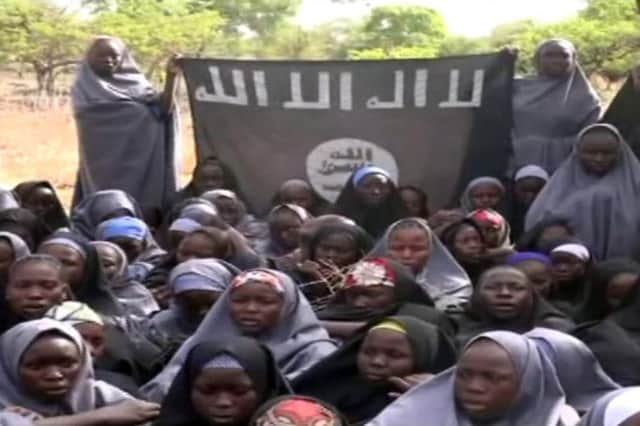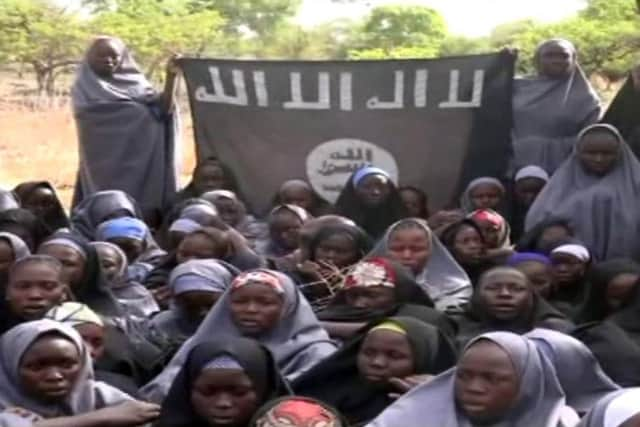Boko Haram release ‘video’ of kidnapped girls


In the first public sighting of the girls since the mass abduction last month, the Boko Haram group’s video showed them huddled together and offered to free them in exchange for prisoners loyal to its cause.
Residents in the town where families await news of the girls’ fate said the video offered hope.
Advertisement
Hide AdAdvertisement
Hide AdMike Omeri, of the Nigerian ministry of information, said: “The government of Nigeria is considering all options towards freeing the girls and reuniting them with their parents.”


The short film claims to show about 130 of the girls who were seized from their school. Boko Haram’s leader, Abubakar Shekau, is also seen, insisting the girls will be held until all imprisoned militants have been freed.
There has been speculation the comments could pave the way for a negotiated settlement – Shekau previously insisted the hostages would be sold.
Prime Minister David Cameron’s spokesman said of the video: “It underlines the horror and the barbarity of the actions in the kidnapping of these girls.
“It underlines the importance of working with and in support of the Nigerian authorities and Nigerian people in terms of trying to bring about the release of the kidnapped girls, which is so important.”
The Boko Haram video, made exactly four weeks after 276 girls were kidnapped from their secondary school in the north-eastern town of Chibok, shows about 100 girls wearing full veils and praying in an undisclosed location.
The 17-minute film – imprinted with the Boko Haram insignia of a Koran resting on two crossed assault rifles and below the black jihadi flag – also shows Shekau in military fatigues cradling an assault rifle.
Speaking in the Hausa language of northern Nigeria, he states: “These girls, these girls you occupy yourselves with, we have indeed liberated them. These girls have become Muslims.”
Advertisement
Hide AdAdvertisement
Hide AdDescribing his terms to end the kidnapping, he says: “We will never release them until after you release our brethren. Here, I mean those girls who have not submitted [converted to Islam].”
The video shows three girls wearing the full-length hijab, two of whom say they were Christian and have converted to Islam, while the other says she is Muslim. There is no indication of where or when the footage was taken.
Although some of the girls taken hostage on 14 April managed to escape, about 200 remain missing.
The attack provoked global outrage, and concern about the girls’ fate deepened when Shekau threatened in a video earlier this month to sell the girls “in the market”.
The mass abduction triggered a support campaign using the Twitter hashtag #BringBackOurGirls, which has been backed by politicians and celebrities across the world, including US First Lady Michelle Obama.
In Chibok, Pogu Bitrus, one of the town’s civil leaders, said: “There’s an atmosphere of hope – hope that these girls are alive, whether they have been forced to convert to Islam or not.”
He said the surroundings featured in the footage resembled the Sambisa Forest, a massive region some 19 miles from Chibok.
Last night, it was reported Nigeria’s interior minister, Abba Moro, had rejected the offer to negotiate the return of the girls in exchange for the release of prsioners, saying it was “absurd” for Boko Haram to try to set conditions.
Advertisement
Hide AdAdvertisement
Hide AdA UK team, including counter-terrorism and intelligence experts, has arrived in Nigeria and held talks with political leaders.
Former prime minister Gordon Brown, who has been visiting Nigeria in his role as United Nations special envoy for global education, said: “There will be worldwide condemnation of a new video showing Boko Haram cruelly and barbarically using 200 kidnapped girls to bargain for the release of prisoners.
“It is urgent that all religious leaders in every part of the world speak out against their perverted and twisted version of Islam, which involves forced conversions and the sale of girls as sex slaves.”
Authorities in Nigeria are holding hundreds of suspected Boko Haram militants and there have been several attempted jailbreaks. Suspected militants overpowered guards at a prison in Abuja in March, triggering a gun battle that killed 21 people.
Nigerian leader to attend terror summit
NIGERIAN president Goodluck Jonathan has agreed to attend a security summit in Paris focusing on the Boko Haram terrorist network that is behind the girls’ kidnapping, according to French officials.
France is still waiting for confirmation from leaders of the four countries bordering Nigeria – Benin, Chad, Niger and Cameroon – on whether they will attend Saturday’s event. Representatives from Britain, the European Union and United States are also being invited.
French president Francois Hollande had proposed the summit, in part due to the threat posed by Boko Haram to his nation’s citizens based in Nigeria. A French priest was released in December after being kidnapped the previous month in northern Cameroon, where Boko Haram is known to operate. The group also kidnapped a French family of seven on holiday in the area in February 2013 before freeing them the following April.
Mr Jonathan’s spokesman, Reuben Abati said yesterday that the objective of the summit was to “deepen the co-operation and partnership between Nigeria and her neighbours”.
Advertisement
Hide AdAdvertisement
Hide AdAlong with Nigeria’s neighbours, senior politicians from the EU, including Foreign Secretary William Hague, are expected to attend, amid intensifying efforts to counter the threat posed by Boko Haram.
The group – whose name, loosely translated from the local Hausa language, means “western education is forbidden” – promotes a version of Islam that makes it “haram”, or forbidden, for Muslims to take part in any political or social activity associated with western society.
The group’s adherents are influenced by the Koranic phrase which says: “Anyone who is not governed by what Allah has revealed is among the transgressors.”
Timeline of an abduction that sparked global fury
14 APRIL 276 girls are abducted from their secondary school in the north-east Nigerian village of Chibok by Boko Haram militants
15 APRIL A local government official in Nigeria confirms the mass abduction but suggests the number of missing pupils is about 100.
19 APRIL The school’s headmistress, Asabe Kwambura, asks the government to do more to save the girls and calls on Boko Haram to “have mercy on the students”.
22 APRIL A local government official claims about 80 of the girls remain missing, but Ms Kwambura rejects the figure, putting the tally at some 190.
23 APRIL Amid growing frustration in Nigeria, Abuja-based lawyer Ibrahim Abdullahi sends the first tweet using the hashtag #BringBackOurGirls.
Advertisement
Hide AdAdvertisement
Hide Ad30 APRIL Hundreds march through Abuja to protest at government “indifference” to the mass abduction.
2 MAY Nigerian police say militants are holding 223 girls, after 53 manage to escape.
4 MAY In his first public comments about the abduction, president Goodluck Jonathan says his government is seeking assistance from the US and other world powers to tackle Nigeria’s “security challenge”.
6 MAY US president Barack Obama says the “heartbreaking” abduction may be the event that helps to mobilise the entire international community to finally act against Boko Haram.
7 MAY The #BringBackOurGirls hashtag reaches one million tweets as US First Lady Michelle Obama joins the campaign.
9 MAY Amnesty International accuses Nigeria’s military of ignoring warnings before the abduction.
12 MAY Boko Haram issues a new video claiming to show about 130 of the abducted girls at an unknown location.
SEE ALSO: